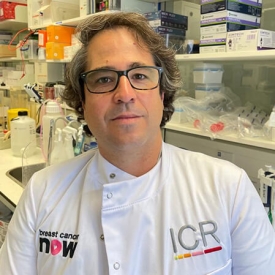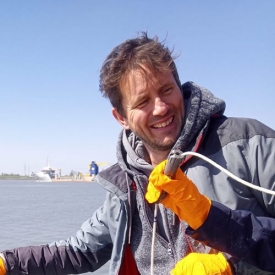Positive Droplet Awards Recipients
A celebration of Discoveries and Insights Driven by the Adoption of Droplet Digital™ PCR (ddPCR™) Technology
Congratulations to all of our recipients! Below are recipients of previous Positive Droplet Award categories, including biographies and links to publications where you can learn more about the ddPCR achievements that made them stand out amongst their peers.
Recipients of the Positive Droplet Award
Oncology
-
Image

Recognized for contributions to
OncologyRemco de Kock, PhD
Clinical Laboratory Department — Catharina Hospital Eindhoven (The Netherlands) -
Image

Recognized for contributions to
OncologyDragana Milosevic
Principal Developer, Department of Laboratory Medicine and Pathology — Mayo Clinic -
Image

Recognized for contributions to
Liquid BiopsyEd Schuuring, PhD
Clinical Scientist, Department of Pathology — University of Groningen University Medical Center Groningen -
Image

Recognized for contributions to
Rare Mutation DetectionDr. Valérie Taly
Group Leader — Translational Research and Microfluidics Cordeliers Research Center (France) -
Image

Recognized for contributions to
Solid Tumor Molecular Residual DiseaseIsaac Garcia-Murillas, PhD
Staff Scientist, The Breast Cancer Now Toby Robins Research Centre — The Institute of Cancer Research, London -
Image

Recognized for contributions to
Oncology – Hematological MalignanciesDr. Jerry Radich
Member, Clinical Research Division — National Center for Child Health and Development -
Image

Recognized for contributions to
Oncology – Hematological MalignanciesSimona Soverini, PhD
Assistant Professor of Hematology, Institute of Hematology “Lorenzo e Ariosto Seragnoli" — University of Bologna
Human Health
-
Image

Recognized for contributions to
Respiratory DiseaseRaphael Nyaruaba, PhD
Key Laboratory of Special Pathogens and Biosafetya — Wuhan Institute of Virology (China) -
Image

Recognized for contributions to
Clinical AdvancementGary Pestano, PhD
Chief Development Officer — Biodesix Inc. -
Image

Recognized for contributions to
Pediatric Disease DetectionDr. Ana Bustamante
Assistant to Head of the Genetics Department — University Hospital Fundación Jiménez Díaz. Madrid (Spain) -
Image

Recognized for contributions to
Immunotherapy MonitoringDr. Boris Fehse
Professor in Cell and Gene Therapy, Head of Research Department — UMC Hamburg-Eppendorf -
Image

Recognized for contributions to
Virus DetectionLaboratory of Viral Immunology Section (VIS)
National Institute of Neurological Disorders and Stroke (NINDS) — National Institutes of Health (NIH) -
Image

Recognized for contributions to
Transplantation StabilityAlexander Dobrovic, PhD
Assoc. Prof. and Head of Translational Genomics & Epigenomics Lab, Department of Surgery — University of Melbourne -
Image

Recognized for contributions to
Fight Against SARS-CoV-2Dr. Elena Pomari
Research Scientist, Technology Transfer Manager — IRCCS Sacro Cuore Don Calabria Hospital, Infectious-Tropical Diseases Labs -
Image

Recognized for contributions to
Adult Disease DetectionMallika Imwong, PhD
Professor, Department of Molecular Tropical Medicine and Genetics, Faculty of Tropical Medicine — Mahidol University -
Image

Recognized for contributions to
Viral Load QuantificationClaudia Alteri, PhD
Assistant Professor, Department of Oncology and Hemato-Oncology — University of Milan
Public Health
-
Image

Recognized for contributions to
Wastewater-Based EpidemiologyRaul Gonzalez, PhD
Environmental Scientist — Hampton Roads Sanitation District (Virgina Beach, VA, U.S.A) -
Image

Recognized for contributions to
Environmental TestingDr. Rein Brys
Senior Researcher and Molecular Ecologist — Research Institute for Nature and Forest (Belgium) -
Image

Recognized for contributions to
Water TestingDr. Shane Rogers
Associate Professor of Environmental Engineering — Clarkson University -
Image

Recognized for contributions to
Food TestingDr. Dany Morisset and Dr. David Dobnik
Dr. Morisset, Director for Intellectual Property, Regulatory Affairs and Quality — Kemin Europa
Dr. Dobnik, Senior Research Associate at National Institute of Biology and Chief Scientific Officer — Niba Labs
Genetics and Genomics
-
Image

Recognized for contributions to
Genome EditingBruce R. Conklin, MD
Professor — UCSF
Senior Investigator — Gladstone Institutes
Deputy Director — Innovative Genomics Institutes -
Image

Recognized for contributions to
Copy Number VariationDr. Mario Caceres and Dr. Marta Puig
Institut de Biotecnologia i de Biomedicina — Universitat Autonoma de Barcelona (Spain) -
Image

Recognized for contributions to
Methylation DetectionDr. William Grady and Dr. Ming Yu
Dr. Grady, Professor of Medicine — Fred Hutchinson Cancer Research Center and University of Washington School of Medicine
Dr. Yu, Principal Staff Scientist — Fred Hutchinson Cancer Research Center -
Image

Recognized for contributions to
miRNA Detection and QuantificationDr. Luca Falzone
Epidemiology and Biostatistics Unit National Cancer Institute (Italy) -
Image

Recognized for contributions to
Single Cell ExpressionToru Uchiyama, MD, PhD
Chief, Department of Human Genetics Director of R&D, Gene and Cell Therapy Promotion Center — National Center for Child Health and Development
Fundamental Studies
-
Image

Recognized for contributions to
Clinical and Laboratory Hematology Teaching and ResearchAlec Morley, MD
Emeritus Professor, Department of Haematology and Genetic Pathology — Flinders University (Australia) -
Image

Recognized for contributions to
MetrologyDepartment of Biotechnology and Systems Biology (FITO)
National Institute of Biology (Slovenia) -
Image

Recognized for contributions to
Advanced MultiplexingDr. David Dobnik
Senior Research Associate — National Institute of Biology Chief Scientific Officer — Niba Labs
Nominations Now Open!
Would you like to be considered for a Positive Droplet Award based on your research using ddPCR technology?
Do you know someone who should be considered for an award for their work using ddPCR technology?
Submit a nomination for a future Positive Droplet Award.
Submit a Nomination Now
Dragana Milosevic
Principal Developer, Department of Laboratory Medicine and Pathology — Mayo Clinic
Dragana Milosevic works as Principal Developer in the Department of Laboratory Medicine and Pathology at Mayo Clinic in Rochester, Minnesota. During the last 10 years, she has developed and implemented numerous clinical assays that were based on ddPCR methodology. She was awarded with an Outstanding Speaker Award at AACC in 2014 with a topic on benefits of ddPCR in CNV analysis in FFPE specimens.
Significant Publications
- Applying Standard Clinical Chemistry Assay Validation to Droplet Digital PCR Quantitative Liquid Biopsy Testing
- Sensitive Detection of Integrated and Free Transcripts in Chimeric Antigen Receptor T-cell Manufactured Cell Products Using Droplet Digital Polymerase Chain Reaction
- Analysis of Cell-Free DNA to Access Risk of Tumoremia Following Endoscopic Ultrasound Fine-Needle Aspiration of Pancreatic Adenocarcinomas

Isaac Garcia-Murillas, PhD
Staff Scientist, The Breast Cancer Now Toby Robins Research Centre — The Institute of Cancer Research, London
Dr. Isaac Garcia-Murillas is a Staff Scientist at the Breast Cancer Now Toby Robins Research Centre at The Institute of Cancer Research in London where he leads and develops the use of Next Generation Sequencing (NGS) and digital PCR (dPCR) technologies to study circulating tumour DNA (ctDNA) from liquid biopsies. His research interests converge in the clinical utility of ctDNA as a potential biomarker to detect Minimal Residual Disease, monitor response to treatment, stratify patients to targeted therapies, and identify the emergence of drug resistance.
Significant Publications

Dr. Jerry Radich
Member, Clinical Research Division — National Center for Child Health and Development
Dr. Jerald Radich is a Member of the Clinical Research Division, the Director the Molecular Oncology Lab and the Kurt Enslein Endowed Chair at the Fred Hutchinson Cancer Research Center. Dr. Radich’s laboratory research centers on the molecular biology of response, resistance, and progression in leukemia. He was awarded the International CML Foundation Award in 2017 and the Washington Global Health Alliance Partnership Award in 2019 for his lab’s work on BCR-ABL1 testing in the developing world.
Significant Publications
- Assessment of Outcomes After Stopping Tyrosine Kinase Inhibitors Among Patients With Chronic Myeloid Leukemia
- Self-digitization Microfluidic Chip for Absolute Quantification of mRNA in Single Cells
- Absolute Quantitative Detection of ABL Tyrosine Kinase Domain Point Mutations in Chronic Myeloid Leukemia Using a Novel Nanofluidic Platform and Mutation-Specific PCR

Simona Soverini, PhD
Assistant Professor of Hematology, Institute of Hematology “Lorenzo e Ariosto Seragnoli" — University of Bologna
Dr. Soverini leads the Myeloid Leukemia Research laboratory at the “Seragnoli" Institute of Hematology in Bologna. Her research focuses on the identification of drug resistance mechanisms and novel therapeutic targets in acute and chronic myeloid leukemias. She also has an interest in the application of novel technologies as diagnostic tools. Dr. Soverini is the first or contributing author of over 160 publications in international peer reviewed journals.
Significant Publications
- Detection of Actionable BCR-ABL1 Kinase Domain (KD) Mutations in Chronic Myeloid Leukemia (CML) Patients with Failure and Warning Response to Tyrosine Kinase Inhibitors (TKIs): Potential Impact of Next-Generation Sequencing (NGS) and Droplet Digital PCR (ddPCR) on Clinical Decision Making
- Molecular Testing in CML between Old and New Methods: Are We at a Turning Point?
- Droplet Digital PCR Phasing (DROP-PHASE): A Novel Method for Straightforward Detection of BCR-ABL1 Compound Mutations in Tyrosine Kinase Inhibitors Resistant Chronic Myeloid Leukemia (CML) and Acute Lymphoblastic Leukemia (ALL)

Ed Schuuring, PhD
Clinical Scientist, Department of Pathology University of Groningen, University Medical Center Groningen
Dr. Schuuring has served as staff clinical scientist in Molecular Pathology at LUMC and UMCG. He currently serves as chair of the Laboratory for Molecular Pathology. Dr. Schuuring’s research interests include identification and implementation of tumor biomarkers associated with early detection, treatment prediction, MRD, response monitoring and resistance detection to TKI-/immunotherapy in cervical cancer, GIST and NSCLC in tumor tissue-biopsies and cell-free plasma.
Significant Publications
- Circulating Tumor DNA as a Biomarker for Monitoring Early Treatment Responses of Patients with Advanced Lung Adenocarcinoma Receiving Immune Checkpoint Inhibitors
- Technical Evaluation of Commercial Mutation Analysis Platforms and Reference Materials for Liquid Biopsy Profiling
- A Single Digital Droplet PCR Assay to Detect Multiple KIT Exon 11 Mutations in Tumor and Plasma from Patients with Gastrointestinal Stromal Tumors

Dr. Valérie Taly
Group Leader, Translational Research and Microfluidics Cordeliers Research Center (France)
Valerie Taly is a research director and group leader of the Translational Research And Microfluidics group within the Cordeliers Research Center. This interdisciplinary group focuses on the development of microfluidic tools for cancer research. Dr. Taly’s group has pioneered the use of ddPCR to detect tumor-specific genetic and epigenetic alterations. Most recently her group has also been involved in ddPCR development for the follow-up of COVID-19 patients.
Significant Publications
- Quantitative and Sensitive Detection of Rare Mutations Using Droplet-based Microfluidics
- A Study of Hypermethylated Circulating Tumor DNA as a Universal Colorectal Cancer Biomarker
- Early Evaluation of Circulating Tumor DNA as Marker of Therapeutic Efficacy in Metastatic Colorectal Cancer Patients (PLACOL Study)

Dr. Elena Pomari
Research Scientist, Technology Transfer Manager — IRCCS Sacro Cuore Don Calabria Hospital, Infectious-Tropical Diseases Labs
Dr. Elena Pomari works on the development of innovative nucleic acid detection and quantification assays. She and her colleagues were the first group to assess and directly quantify SARS-CoV-2, using droplet digital PCR. Moreover, she has managed development and technology transfer projects for international companies in the field of infectious diseases.
Significant Publications
- Assessment of the Direct Quantitation of SARS-CoV-2 by Droplet Digital PCR
- Impact of Full Vaccination with mRNA BNT162b2 on SARS-CoV-2 Infection: Genomic and Subgenomic Viral RNAs Detection in Nasopharyngeal Swab and Saliva of Health Care Workers
- High Dose Ivermectin for the Early Treatment of COVID-19 (COVER Study): A Randomised, Double-Blind, Multicentre, Phase II, Dose-Finding, Proof of Concept Clinical Trial

Laboratory of Viral Immunology Section (VIS)
National Institute of Neurological Disorders and Stroke (NINDS) — National Institutes of Health (NIH)
The Viral Immunology Section (VIS) has focused its research on the virological characteristics of chronic, neurological disease associated with human viruses. VIS designed and developed ddPCR multiplex assays for the simultaneous detection of human beta-herpesviruses (HHV6A & B) and variants of poliomavirus (JCV) that coinfect human population. VIS also uses ddPCR assays to detect HTLV-I, HTLV-II, EBV, CMV and endogenous retrovirus (HERVW), contributing to the viral diagnosis of viruses that play an important role in the pathogenesis of neurological diseases.
Significant Publications
- Using Droplet Digital PCR to Detect Coinfection of Human Herpesviruses 6A and 6B (HHV-6A and HHV-6B) in Clinical Samples
- Human Herpesvirus Multiplex ddPCR Detection in Brain Tissue from Low- and High-Grade Astrocytoma Cases and Controls
- Digital Droplet PCR (ddPCR) for the Precise Quantification of Human T-Lymphotropic Virus 1 Proviral Loads in Peripheral Blood and Cerebrospinal Fluid of HAM/TSP Patients and Identification of Viral Mutations

Dr. Dany Morisset and Dr. David Dobnik
Dr. Morisset, Director for Intellectual Property, Regulatory Affairs and Quality — Kemin Europa
Dr. Dobnik, Senior Research Associate at National Institute of Biology and Chief Scientific Officer — Niba Labs
Dr. Morisset is currently a director at Kemin Europa n.v., an animal nutrition and health company. Dr. Dobnik, head of GMO detection laboratory at NIB, is focused on the development of new nucleic acid detection and quantification approaches. Their team has pioneered the use of ddPCR to quantify genetic modifications targets for official regulatory enforcement purpose, and are the first lab in Europe to implement ddPCR methods into the routine GMO diagnostics under ISO/IEC 17025 accreditation.
Significant Publications
- Quantitative Analysis of Food and Feed Samples with Droplet Digital PCR
- Multiplex Quantification of Four DNA Targets in One Reaction with Bio-Rad Droplet Digital PCR System for GMO Detection
- Multiplex Quantification of 12 European Union Authorized Genetically Modified Maize Lines with Droplet Digital Polymerase Chain Reaction

Dr. Ana Bustamante
Assistant to Head of the Genetics Department — University Hospital Fundación Jiménez Díaz. Madrid (Spain)
Dr. Ana Bustamante’s focus is on prenatal and preimplantation genetic diagnosis of monogenic disorders. In 2008, she obtained her PhD for research in the field of non-invasive prenatal diagnosis of monogenic diseases. Focused on improving reproductive options for patients with genetic disorders, application of ddPCR in this field has led to the incorporation of new non-invasive prenatal studies for the detection of genetic fetal diseases in clinical practice.
Significant Publications
- Fetal Genotyping in Maternal Blood by Digital PCR: Towards NIPD of Monogenic Disorders Independently of Parental Origin
- Non-Invasive Prenatal Diagnosis in the Management of Preimplantation Genetic Diagnosis Pregnancies
- CLAPO Syndrome: Identification of Somatic Activating PIK3CA Mutations and Delineation of the Natural History and Phenotype

Mallika Imwong, PhD
Professor, Department of Molecular Tropical Medicine and Genetics, Faculty of Tropical Medicine — Mahidol University
Mallika Imwong, PhD in Tropical Medicine, focuses on understanding how drug resistance emerges and spreads in malaria parasites in Asia and Africa and how to detect and characterize the true epidemiology of malaria in low transmission settings. Her research has been focused on digital PCR since 2014. She and her colleagues were the first to report high-level, absolute multiplex quantification for four human Plasmodium species using droplet digital PCR.
Significant Publications

Dr. Boris Fehse
Professor in Cell and Gene Therapy, Head of Research Department — UMC Hamburg-Eppendorf
Dr. Fehse obtained his PhD on retroviral vectors at the Pette institute in Hamburg. He progressed his scientific career within cell and gene therapy focusing on permanent genetic modification of cells using integrating vectors and genome editing, for both basic research and clinical gene therapy. He has pioneered the use of dPCR for different application in molecular diagnostics, including chimerism analysis and high-sensitivity detection of vector-transduced and gene-edited cells.
Significant Publications

Gary Pestano, PhD
Chief Development Officer — Biodesix Inc.
Dr. Pestano is the Chief Development Officer at Biodesix, a leading liquid biopsy molecular diagnostics company. He has focused on assay development of diagnostic test for oncology and virology, with emphasis on liquid and tissue biopsies. Dr. Pestano has fostered many collaborations in the biotechnology industry including with Bio-Rad on the development of ddPCR assays intended for use in clinical testing laboratories.
Significant Publications
- Development and Clinical Utility of a Blood-Based Test Service for the Rapid Identification of Actionable Mutations in Non–Small Cell Lung Carcinoma
- A Blood-based Test for the Detection of ROS1 and RET Fusion Transcripts from Circulating Ribonucleic Acid Using Digital Polymerase Chain Reaction
- Longitudinal Monitoring for the Emergence of Epidermal Growth Factor C797S Resistance Mutations in Non-Small Cell Lung Cancer Using Blood-Based Droplet Digital PCR

Dr. Shane Rogers
Associate Professor of Environmental Engineering — Clarkson University
Dr. Shane Rogers is an Associate Professor of Environmental Engineering at Clarkson University (2007 – current), where he conducts research and teaches courses in environmental biotechnology and wastewater engineering, among others. He earned his Ph.D. from Iowa State University in 2004, and worked for the U.S. EPA from 2004 – 2013. His research explores the fate and transport of pathogens from human and livestock wastewater treatment systems, including health risks and mitigation.
Significant Publications
- Microbial Adaptation and Response to High Ammonia Concentrations and Precipitates During Anaerobic Digestion Under Psychrophilic and Mesophilic Conditions
- Antibiotic-Resistant Genes and Pathogens Shed by Wild Deer Correlate with Land Application of Residuals
- Emission and Dispersion of Bioaerosols from Dairy Manure Application Sites: Human Health Risk Assessment

Dr. Rein Brys
Senior Researcher and Molecular Ecologist — Research Institute for Nature and Forest (Belgium)
Dr. Rein Brys is a senior researcher and molecular ecologist at the Research Institute for Nature and Forest (Brussels, Belgium). He is an expert in ecology, evolutionary biology and species conservation. His lab is currently using and developing eDNA based approaches, such as ddPCR and next generation sequencing, to study freshwater fish and amphibian species and their communities.
Significant Publications
- Reliable eDNA Detection and Quantification of the European Weather Loach (Misgurnus fossilis)
- Accurate Detection and Quantification of Seasonal Abundance of American Bullfrog (Lithobates catesbeianus) Using ddPCR eDNA Assays
- Effects of Preservation Strategies on Environmental DNA Detection and Quantification Using ddPCR

Dr. William Grady and Dr. Ming Yu
Dr. Grady, Professor of Medicine — Fred Hutchinson Cancer Research Center and University of Washington School of Medicine
Dr. Yu, Principal Staff Scientist — Fred Hutchinson Cancer Research Center
Dr. Grady is a physician-scientist who conducts translational research on gastrointestinal cancer. His group is a nationally recognized leader in methylation-specific droplet digital PCR (MS-ddPCR) and was one of the innovators of this method. Dr. Yu has pioneered methylation-specific droplet digital PCR assays for the detection and absolute quantification of infrequently methylated genes in normal colon mucosa and stool samples. Her work has opened the possibility of identifying DNA methylation loci as biomarkers of field cancerization.
Significant Publications

Bruce R. Conklin, MD
Professor — UCSF
Senior Investigator — Gladstone Institutes
Deputy Director — Innovative Genomics Institutes
Bruce R. Conklin, MD is a Senior Investigator at the Gladstone Institutes, a Professor at UCSF, and Deputy Director of the Innovative Genomics Institute founded by Jennifer Doudna, Ph.D. Using patient-derived induced pluripotent stem cells, the Conklin Lab focuses on biomedical applications of CRISPR technology with emphasis on diseases such as ALS. Decoding human genetic disease allows development of models that can be directly tested with gene correction or targeted drug therapy.
Significant Publications

Toru Uchiyama, MD, PhD
Chief, Department of Human Genetics Director of R&D, Gene and Cell Therapy Promotion Center — National Center for Child Health and Development
Toru Uchiyama, MD, PhD focuses on the development of gene-based therapeutic strategies for primary immunodeficiency diseases. He has performed gene therapy clinical trials in Japan and analyzes the patients for the detailed distribution of vector-marked cells using droplet digital PCR (ddPCR). Recently, he has developed the single-cell ddPCR system that enables quick identification of the target sequences in the genome in the subdivided target cell subsets.
Significant Publications
- Single Cell-Based Vector Tracing in Patients with ADA-SCID Treated with Stem Cell Gene Therapy
- Direct Assessment of Single-Cell DNA Using Crudely Purified Live Cells: A Proof of Concept for Noninvasive Prenatal Definitive Diagnosis
- Nonconditioned ADA-SCID Gene Therapy Reveals ADA Requirement in the Hematopoietic System and Clonal Dominance of Vector-Marked Clones

Alexander Dobrovic, PhD
Assoc. Prof. and Head of Translational Genomics & Epigenomics Lab, Department of Surgery — University of Melbourne
Alexander Dobrovic’s lab has a focus on personalized medicine including developing innovative, clinically relevant, affordable methodologies. His lab is accredited for medical testing for tissue and liquid biopsy assays for mutations including BRAF and EGFR mutations for diagnostics and monitoring of melanoma and lung cancer, as well as DNA methylation assays. His current focus is on using ddPCR for disease monitoring using plasma DNA in organ transplantation.
Significant Publications
- A Synthetic DNA Construct to Evaluate the Recovery Efficiency of Cell-Free DNA Extraction and Bisulfite Modification
- The Measurement of Donor-Specific Cell-Free DNA Identifies Recipients With Biopsy-Proven Acute Rejection Requiring Treatment After Liver Transplantation
- Probe-Free Digital PCR Quantitative Methodology to Measure Donor-Specific Cell-Free DNA after Solid-Organ Transplantation

Dr. Luca Falzone
Epidemiology and Biostatistics Unit National Cancer Institute (Italy)
Luca Falzone is a researcher with the Epidemiology Unit of the National Cancer Institute of Naples (Italy) and head of the Computational Biology and Biomarker Discovery group in the Department of Biomedical and Biotechnological Sciences at University of Catania. Using droplet digital PCR, he developed high-sensitive approaches to detect DNA methylation hotspots, circulating miRNAs, circulating tumor mutations, low amount of bacterial and viral nucleic acids and diagnostic methods for diagnosis of COVID-19 infection.
Significant Publications
- Sensitivity Assessment of Droplet Digital PCR for SARS-CoV-2 Detection
- Droplet Digital PCR Analysis of Liquid Biopsy Samples Unveils the Diagnostic Role of hsa-miR-133a-3p and hsa-miR-375-3p in Oral Cancer
- MMP-9 as a Candidate Marker of Response to BRAF Inhibitors in Melanoma Patients With BRAFV600E Mutation Detected in Circulating-Free DNA

Claudia Alteri, PhD
Assistant Professor, Department of Oncology and Hemato-Oncology — University of Milan
Dr. Alteri is an Assistant Professor in Clinical Microbiology at University of Milan. Since 2004, she has focused on unravelling the role of microbial genetics and persistence on microbial pathogenicity, disease progression and treatment response. Her research outcomes are rapidly translated into clinical practice, thus guaranteeing a precision medicine approach. She is author of many publications in peer-reviewed international journals, including Nature Communications, Journal of Hepatology, and CID.
Significant Publications
- Detection and Quantification of SARS-CoV-2 by Droplet Digital PCR in Real-Time PCR Negative Nasopharyngeal Swabs From Suspected COVID-19 Patients
- Quantification of HIV-DNA and Residual Viremia in Patients Starting ART by Droplet Digital PCR: Their Dynamic Decay and Correlations With Immunological Parameters and Virological Success
- Rapid Detection and Quantification of Mycobacterium tuberculosis DNA in Paraffinized Samples by Droplet Digital PCR: A Preliminary Study

Dr. Mario Caceres and Dr. Marta Puig
Institut de Biotecnologia i de Biomedicina — Universitat Autonoma de Barcelona (Spain)
Mario Cáceres has a long research career investigating the genetic basis of phenotypic traits. His group focuses on the characterization of human inversions, a type of genomic variant that is commonly missed by most studies. Marta Puig is a genomics and evolution researcher at the UAB. Her focus is development of diverse approaches to genotype complex variants in the human genome using different molecular biology techniques.
Significant Publications
- Determining the Impact of Uncharacterized Inversions in the Human Genome by Droplet Digital PCR
- New Susceptibility Loci for Severe COVID-19 by Detailed GWAS Analysis in European Populations
- Single-cell Strand Sequencing of a Macaque Genome Reveals Multiple Nested Inversions and Breakpoint Reuse During Primate Evolution

Dr. David Dobnik
Senior Research Associate — National Institute of Biology Chief Scientific Officer — Niba Labs
David Dobnik, PhD in Biotechnology, focuses on the development of new nucleic acid detection and quantification approaches. Since 2013, his work has been focused on digital PCR. He and his colleagues were the first group to report high-level absolute multiplex quantification using droplet digital PCR. More recently, he has led and managed development and technology transfer projects for pharmaceutical companies focused on the field of gene therapy.
Significant Publications
- Multiplex Quantification of 12 European Union Authorized Genetically Modified Maize Lines with Droplet Digital Polymerase Chain Reaction
- Multiplex Quantification of Four DNA Targets in One Reaction with Bio-Rad Droplet Digital PCR System for GMO Detection
- Development and Inter-laboratory Assessment of Droplet Digital PCR Assays for Multiplex Quantification of 15 Genetically Modified Soybean Lines

Department of Biotechnology and Systems Biology (FITO)
National Institute of Biology (Slovenia)
National Institute of Biology, Department of Biotechnology and Plant Biology, pioneers in research and application of genetically modified organisms and pathogenic microorganisms. By harnessing the potential of digital PCR for absolute quantification NIB improved metrological traceability of biological measurements. NIB’s outstanding contributions support accurate food safety and environmental monitoring, healthy plants for sustainable agriculture and better health through precision medicine.
Significant Publications

Raphael Nyaruaba, PhD
Diagnostic Microbiology — Wuhan Institute of Virology, Center for Bio-Safety Mega-Science
Raphael Nyaruaba, PhD in Microbiology, is a research fellow at the Wuhan Institute of Virology and serves as the Senior Medical and Technical Advisor to InVitro Vista. His research focuses on developing rapid molecular diagnostic tools for diagnosing infectious diseases like SARS-CoV-2 and tuberculosis, with a special focus on the applications of digital PCR for such diseases. He aims to introduce these techniques in Africa and other low-resource countries.
Significant Publications
- Developing multiplex ddPCR assays for SARS-CoV-2 detection based on probe mix and amplitude based multiplexing
- Development and evaluation of a single dye duplex droplet digital PCR assay for the rapid detection and quantification of Mycobacterium tuberculosis
- Digital PCR applications in the SARS-CoV-2/COVID-19 era: a roadmap for future outbreaks
Watch Dr. Nyaruaba’s interview

Alec Morley, MD
Emeritus Professor, Department of Haematology and Genetic Pathology — Flinders University (Australia)
Alec Morley’s career involved clinical and laboratory haematology, teaching, and research. Research areas included periodic diseases, aplastic anaemia, human somatic mutation, biology of ageing and genetic toxicology. His laboratory pioneered study of minimal residual disease in hematologic cancer and developed and applied molecular techniques for diagnosis and monitoring of disease. Such techniques include the original descriptions of digital (limiting dilution) PCR and its use for quantifying residual disease in leukemia, detection of lymphocyte clonality by PCR, detection of the BCR-ABL transcript by PCR, and High-AnnealingTemperature (HAT) PCR.
Significant Publications
- Quantitation of targets for the polymerase chain reaction by use of limiting dilution
- Outcome prediction in childhood acute lymphoblastic leukaemia by molecular quantification of residual disease at the end of induction
- Digital PCR: A brief history Biomolecular Detection and Quantification
Watch Dr. Morley’s interview

Remco de Kock, PhD
Clinical Laboratory Department — Catharina Hospital Eindhoven (The Netherlands)
Dr. Remco de Kock worked on the development and implementation of multiplex Droplet Digital™ PCR (ddPCR™) assays for the detection of the most relevant driver and therapy resistance mutations in circulating tumor DNA (ctDNA) to support the diagnosis and therapy response monitoring of lung cancer in routine clinical practice. His research originates from a collaboration between the Catharina Hospital Eindhoven, Máxima Medical Center, and the Eindhoven University of Technology.
Significant Publications
- Optimized (Pre) analytical conditions and workflow for droplet digital PCR analysis of cell-free DNA from patients with suspected lung carcinoma
- Therapy monitoring of EGFR-positive non–small-cell lung cancer patients using ddPCR multiplex assays
- Circulating biomarkers for monitoring therapy response and detection of disease progression in lung cancer patients
Watch Dr. de Kock’s interview

Raul Gonzalez, PhD
Environmental Scientist — Hampton Roads Sanitation District (Virgina Beach, VA, U.S.A)
Raul Gonzalez is an environmental scientist at Hampton Roads Sanitation District (HRSD). His group applies molecular methods to manmade infrastructure and their adjacent waters. During the COVID-19 pandemic, Dr. Gonzalez led the expansion of HRSD’s research and laboratory capacity to identify the best methodological approaches to wastewater-based disease surveillance at the utility. Dr. Gonzalez earned his BS in Biology from the UCLA and his PhD in Environmental Science and Engineering at the UNC Chapel Hill.
Significant Publications
- COVID-19 surveillance in Southeastern Virginia using wastewater-based epidemiology
- Assessing sensitivity and reproducibility of RT-ddPCR and RT-qPCR for the quantification of SARS-CoV-2 in wastewater
- Subsewershed SARS-CoV-2 wastewater surveillance and COVID-19 epidemiology using building-specific occupancy and case data
Watch Dr. Gonzalez’s interview
















